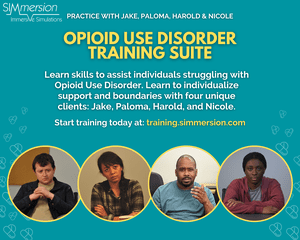
Opioid Use Disorder Training Suite
Scenario
It often takes time for people with Opioid Use Disorders to make a change to stop using drugs, and this change will only happen when they are ready. Peer Recovery Specialists are in a unique position to talk with people who are actively using about their reasons for making a change, as they understand the person’s experience firsthand. The first goal of recovery is encouraging a person to make a commitment to the recovery process. Once commitment is secured, they will need support to manage the difficulties of working through setbacks in recovery. While working with someone in recovery, it is important to maintain proper boundaries and professionalism when handling a person’s recovery support requests. Goal setting is also an important tool for people in recovery .Setting proper goals in recovery is instrumental in providing structure, motivation, and direction for individuals seeking to overcome addiction. Understanding how to effectively handle these conversations with Motivational Interviewing techniques can help lead people to make positive changes in their drug use.
The Opioid Use Disorder Training Suite includes access to four virtual training simulations:
Commitment to Change with Jake Finney: Complete an intake session while building a collaborative relationship with Jake following a recent opioid overdose that resulted in hospitalization. As you complete the intake session, build rapport with Jake to identify his immediate needs, motivations he feels will aid his recovery, and barriers he may have to overcome to succeed in recovery, which change with each new play. After the session, review how well you explored Jake’s needs in recovery and motivated him toward change.
Ongoing Support with Paloma Alvarado: Paloma has been working with a Peer Recovery Specialist after completing an in-patient rehab program. She is expecting an increase of setbacks related to her opioid addiction and is looking for support. Speak with Paloma on the positives of her sobriety, recovery strategies, and willingness to use Medication Assisted Recovery, which will change with each play. After the session, review feedback on how well you discussed recovery goals, motivations for recovery and introducing medication as an option in recovery.
Maintaining Boundaries with Harold Daniels: Harold Daniels has been working with a Peer Recovery Specialist while in recovery from his opioid addiction. Work with Harold to set appropriate boundaries within your dynamic while navigating his barriers in a way that aligns with his recovery goals. During each play, Harold’s support request will vary and may potentially cross into an inappropriate nature. After the session, review how well you explored his recovery support requests and maintained professional boundaries.
Setting Recovery Goals with Nicole Davis: Nicole Davis is a young adult navigating the path of recovery. She has just completed her Strengths Based Assessment (SBA) and now needs to begin setting recovery goals. Work with Nicole to build a collaborative relationship to understand her recovery goals, examine the barriers and motivations surrounding those goals, and help her build Specific, Measurable, Actionable, Realistic, Time-Bound (SMART) recovery goals.
While each program can be used independently of the others, they were developed together to allow Peer Recovery Specialists to practice building skills at their own pace and in a safe learning environment.
Users
Peer Support,
Healthcare & Students
Recommended Plays
3 - 6 minimum per simulation
Average Time
per Session
10 - 30
minutes per simulation
Each virtual person has 3 - 4 character versions based on variations in motivations and barriers for recovery, willingness for change in drug use, types of recovery support requests, and recovery goals. Jake, Paloma, Harold & Nicole provide a varied training experience to prepare learners for the different needs of people with Opioid Use Disorder.
Teaching Objectives:
- Creating a Motivating Conversation
- Building a Collaborative Relationship
- Identifying a Client’s Needs & Goals for Recovery
- Covering Recovery Goal Topics
- Exploring a Client’s Needs to Assess Barriers
- Providing Appropriate Support for a Client
- Maintaining Effective Professional Boundaries
- Defining SMART Goals
- Ensuring Goals are SMART
Included in Training:
- A Training Guide with information on best practices for helping people find their own motivation to change, supporting a person’s continued change following a setback in recovery, preserving rapport with a person in recovery, while maintaining healthy boundaries, and setting SMART recovery goals.
- A Simulated Conversation with 4 varied characters to prepare learners for the different needs of people with Opioid Use Disorder.
- Comprehensive Feedback during and after each play to help guide skill development.
This training was developed in collaboration with The New Jersey Prevention Network. and The Council of Southeast Pennsylvania, Inc. (SEPA). To read more about NJPN's peer support program visit: NJPN Peer Recovery Support. To read more about SEPA's prevention, intervention, and addiction recovery services visit: The Council of Southeast Pennsylvania, Inc.

